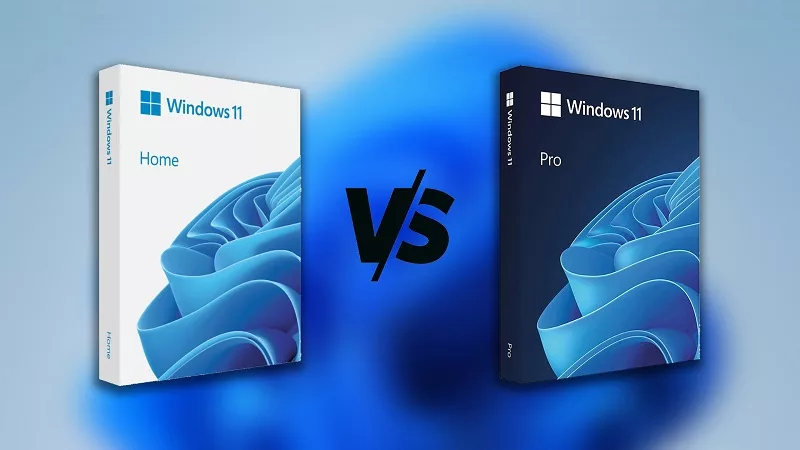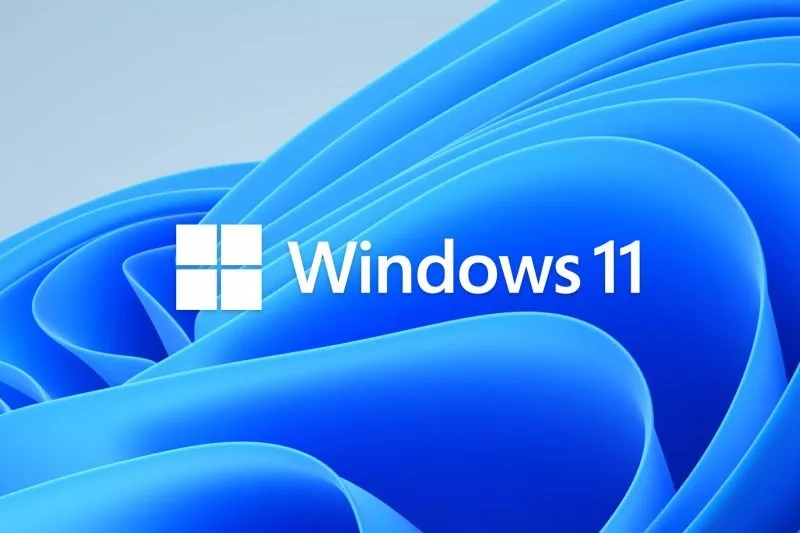You have successfully arrived at the right place if you are considering upgrading your PC and are debating between Windows 11 Home and Windows 11 Pro. Windows 11 has been formally released, and it is currently being gradually distributed to eligible users all over the globe. In order to make their older PCs compliant with Windows 11’s new system specifications, some invalid clients also upgraded the hardware.
There are typically two or more variants of almost every Windows operating system, with the most common being Home and Professional (or Pro). Due to their diverse attributes and focus on various user types, these two Windows operating systems persist. This has a fairly straightforward explanation. While a universal OS without additional editions is undoubtedly feasible, it is preferable to keep multiple versions of Windows because not every user requires every feature and not every computer is compatible with every feature.
Despite all of its benefits, Windows 11 has generated some controversy because of the stringent compatibility requirements that prohibit the majority of current PCs from upgrading to the new software. Although Windows 11 requires the Trusted Platform Module (TPM) 2.0, which is not present in many older laptops and desktops, the minimum hardware needs are similar to those of Windows 10. Although it is possible to circumvent this requirement informally, most mainstream users do not suggest it because it is a laborious process.
For various user types and requirements, Microsoft has provided a variety of Windows editions. Windows 11 comes in about six different versions. It’s normal to become perplexed between Windows 11 Home and Windows 11 Pro if you haven’t upgraded from Windows 10 or are wondering which version will give you more control over your computer.
Let’s quickly go over the features that are shared by Windows 11 Home and Pro before we get into the differences between them. On the Home and Pro versions of Windows 11, you get all the favored new features. Included in this are the newly positioned Start menu, the new Microsoft Store, Snap Layouts, the incorporation of Microsoft Teams chat (which you can turn off), Widgets, and more.
Windows Subsystem for Android, Windows Subsystem for Linux, and other platforms are supported in both the Home and Pro versions of Windows 11. (WSL). It is fantastic that Windows 11 Home and Pro editions include the highly praised AutoHDR function, even in terms of gaming. The support for Windows Hello, Windows Security, Parental Controls, Kids mode in Microsoft Edge, numerous virtual desktops, touch, pen, and speech input, among other features, are additional similarities.
Both editions of Windows 11 have the same base hardware needs for operation. As we can see, both versions of Windows 11 include all of the noteworthy features. Any of the versions will be adequate for a typical user. But if you’re a Pro subscriber, you’d expect more. So let’s read the remainder of the article to discover the differences between Windows 11 Home and Pro.
Simply stated, the Home version is intended for all users and includes all the features that a typical Windows user will require. On the other hand, the Pro version is intended for business or enterprise systems and has extra features to satisfy the standards in that industry. In case you’re also puzzled, we’ve put together a thorough comparison that looks closely at all the key features of Windows 11 Pro to determine whether it’s a worthwhile update over Windows 11 Home.
While Windows 11 Pro has more features than the Home edition, it still works just fine for the majority of users. With the exception of BitLocker and a few business features, all applications operate in the same way. However, Pro has the same system requirements, local account support, and a few additional features if you absolutely must have it.
In this article, we’ve enumerated every significant distinction between Windows 11 Home and Pro. We have also quickly covered the standard features and new additions that the Pro edition offers business users. Let’s get going. The majority of people will be acquainted with Windows 11 Home, which is why we use that version for the majority of the Windows 11 content on this website. As the name implies, it is made for those who use Windows mainly at home or in their personal lives.
However, for some individuals, Windows 11 Pro is also a viable option. Although it may have been designed with business use in mind, there are some helpful features that people can make use of.
The price is the primary distinction between Windows 11 Basic and Pro. The license for Windows 11 Home costs $139.99, while the registration for Windows 11 Pro costs $199.99. However, the majority of computers ship with one of those preinstalled. It will cost you $99.99 to update Windows 11 Home to Windows 11 Pro.
Additionally, it’s crucial to understand that Windows 11 Home will typically fulfill your needs. The Pro edition is intended for professionals, typically those who use their devices for business, as the name suggests. This front has some extra features, but Windows 11 Home is adequate if you’re just purchasing a PC for personal use.
Moving on to other major differences:
Setting Up
You might not be aware of this, but Windows 11 marks the first time Microsoft has altered how you set up a new PC. In order to set up Windows 11 if you are a Windows 11 Home user, you are required to have an internet connection, which can be inconvenient and unintuitive. Windows 11 Home edition cannot be installed using a local account; there is simply no choice. You can install Windows 11 with a local account if you are a Pro customer.
When Windows 11 was first released, the main distinction between the Home and Pro versions was that the former allowed you to set up the computer with a local account, while the latter did not. Although Microsoft later modified this, a Microsoft account is still necessary to set up a Windows 11 Pro device for personal use. When configuring the device for business or school use, you can skip the Microsoft account requirement, or you may choose a hack on both the Home and Pro editions to avoid having one.
Business users will also note that Windows 11 Home PCs cannot be joined to Active Directory, which is another difference. Solutions for Active Directory are required for managing corporate devices, including deploying apps and configuring access to specific resources. This also applies to aspects of Windows 11 like Group Policy. Since all of those are expert tools, most Windows 11 Home users won’t find them useful.
Security
Security is where there are the biggest feature differences between Windows 11 Enterprise and Home. Windows 11 Pro has more robust security measures because it is primarily designed for businesses and other organizations that may stand to lose more from a security breach than a single person’s savings or confidential information.
There are also some additional security features in Windows 11 Pro because business customers frequently handle particularly sensitive information. The support for BitLocker protection comes first. Data on your hard drive is encrypted using this function to prevent unauthorized access. Your files are safe from users besides you, even if your device is stolen.
The two most important ones to be aware of are Windows Information Protection and Bitlocker device protection. Both are a little too demanding for the typical home Computer user and neither is offered by Windows 11 Home. However, a small company owner running Windows 11 Pro could automatically lock down a laptop containing sensitive data if it went missing by using Bitlocker device encryption.
Windows 11 Home and Pro have different Bitlocker Device Encryption features, which is a significant distinction. While Windows 11 Pro has support for Bitlocker security, Windows 11 Home does not. Your complete hard drive and disk volumes can be encrypted using the AES encryption algorithm with Bitlocker encryption. If you store confidential information on the device you use, Windows 11 Pro makes sure that in the event of theft, no one can access your data. To store the encryption keys, it makes use of the Trusted Platform Module, which is a prerequisite for upgrading from Windows 10 to Windows 11.
Of course, using the full extent of these advanced features necessitates the use of expansive Windows PC management tools, such as Microsoft’s Endpoint Manager, which IT professionals use to monitor and handle fleets of Windows devices. Useful information if you work in international sales, but a little overwhelming if you just need a new Windows Computer for your side gig. In conclusion, you should choose the Windows 11 Pro edition if you want better protection for your data.
Owners of Windows 11 Pro also have access to the security features of the Windows Information Protection (or WIP) solution, a catch-all term for a collection of tools you can use to try and stop sensitive data from fleeing your company. This entails taking steps like creating guidelines for what information can and cannot be shared internally and outwardly, searching email and other file-sharing platforms for information that complies with those guidelines, and blocking it from leaving your networks. Because of this, Windows 11 Pro is usually only suggested to people who are purchasing copies of Windows for business use.
Also, stop to consider that despite starting to phase out the Windows Information Protocol in the middle of 2022, Microsoft is urging users of those tools to start switching to its Microsoft Purview solution, which performs many of the same functions.
Virtualization
The support for Windows virtualization features is the following significant distinction between the Home and Pro versions of Windows 11. Virtualization is essentially just the process of instructing your computer to pretend it’s a different kind of computer, is one important area in which Windows 11 Pro excels. Virtual machines won’t alter your host computer, so everything you do is risk-free. Again, you can do this on Home versions using third-party applications like VMware Workstation Player.
Hyper-V and Windows Sandbox are not supported by Windows 11 Home. Contrastingly, Windows 11 Pro offers compatibility for both. Additionally, you cannot use Microsoft Remote Desktop to remotely view a Windows 11 Home PC because it can only be used as a client for Remote Desktop, not a host. But you can accomplish the same things with third-party apps like TeamViewer.
Windows Sandbox is a handy tool that, when started, creates a transient version of Windows inside of Windows 11 that users are able to utilize to do tasks like install software you’re unsure of before you expose it to the entirety of your PC. Although the virtual machine can remember data between restarts in case you need to restart it to install software or perform another similar action, the version of Windows 11 running inside the Sandbox is totally detached from the installed version of Windows 11 operating on your PC (it is “sandboxed”) and essentially gets taken down as soon as you close the Sandbox. Your actions remain there and have no impact on the OS. Additionally, it loads, operates, and ends the session much more quickly than Hyper-V. Keep in mind that Hyper-V enables you to run any other operating system, whereas Windows Sandbox only allows you to use the most recent build of Windows 11. Windows Sandbox is the best method to test a dubious app prior to installing it onto your Windows 11 computer.
You should choose Windows 11 Pro over the Home version if you are an advanced user and require support for native virtualization. Microsoft’s primary hypervisor, Hyper-V, is included with Windows 11 Pro. In contrast to programs like VirtualBox and VMWare, its performance is significantly better. Windows 11 allows you to operate virtual machines of any operating system, including previous iterations of Windows, Linux distributions, and more.
I must admit that I frequently use this feature to try apps on earlier versions of Windows, and I think it’s a fantastic feature upgrade for power users. Having said that, if you use Home, you don’t need to be concerned. We have a comprehensive guide on installing Hyper-V on Windows 11 Home. The linked tutorial is for Windows 10 but should also function perfectly on Windows 11.
Power: CPU and RAM
Since Windows 11 Home and Pro have similar minimum system needs, they can be used on many of the same PCs. In actuality, Windows 11 Home and Windows 11 Pro have distinct upper bounds. For instance, Windows 11 Home PCs are able to accommodate one CPU and one CPU socket, whereas the Pro version supports two. Similar to this, Windows 11 Home can only have 64 CPU cores, whereas Windows 11 Pro can handle up to 128. Additionally, Windows 11 Home is only “allowed” 128GB of RAM. That will, of course, be sufficient for the majority of regular users; even the most sophisticated gaming PCs don’t require this much RAM. Windows 11 Pro, on the other hand, increases that to 2TB, which will primarily be helpful if you plan to setup numerous virtual machines and give them a ton of RAM.
Although Microsoft doesn’t explicitly state this, Windows 11 Pro can actually make use of your PC hardware in ways that the Home edition cannot. However, Microsoft’s decision to downplay these distinctions makes some sense given that they pertain to ostentatious PC builds that the majority of people won’t own. However, you should be aware that Windows 11 Home can only handle 128GB of RAM, so you will need Windows 11 Pro to fully utilize a PC with more than that amount. The majority of us don’t have that much RAM in our computers, but those who do might want to think about spending a little extra money to get a license of Windows 11 Pro.
Gaming
There is no distinction between Windows 11 Home and Pro when it comes to gaming. Xbox Game Bar and Game Mode are supported by both versions. On both operating systems, the speed is also the same.
Even the recently launched AutoHDR function is accessible on both the Home and Pro editions of Windows 11. Therefore, it is safe to state that neither edition will let you down in terms of gaming quality. However, Windows 11 Pro gives you a greater amount of room for hardware growth. In contrast to Windows 11 Home, which supports 1 CPU socket, 64 cores, and up to 128GB of RAM, it supports up to 2 CPU sockets, 128 cores, and up to 2TB of RAM. Simply stated, Windows 11 Home is more than sufficient for the majority of users, including die-hard gamers.
Group policy
One more significant absence from Windows 11 Home is access to Group Policy. In the Home edition, you are unable to access the policies that your computer uses to operate its operating system. For instance, Group Policy offers a setting that is not present on the Settings page that allows you to delay Windows updates for an extended period of time. Also available via the Group Policy Editor are the options to lock particular Windows apps, completely disable Cortana, and modify a variety of other settings. Therefore, choosing Windows 11 Pro would make more sense if you want full authority over your computer. To get Group Policy Editor on Windows 11 Home, however, there is a fix. You can refer to the article in our link for complete steps. Although it’s for Windows 10, Windows 11 can also use the same procedure.
Remote Desktop Connection
Your computer can only function as a client even though Windows 11 Home allows remote desktop connections. Therefore, the Home edition cannot start a remote link. With Windows 11 Pro, however, your computer can function both as the host and the client for a remote desktop link. As a result, Windows 11 Pro gives you remote access to your computer from any location in the globe. With this function, you can access all of your files, change programs, and do much more. However, there are numerous third-party remote desktop programs, like TeamViewer, that provide comparable functions on Windows 11 Home.
Also Read:- How to Fix Windows Pink Screen of Death
Features for Businesses
Windows 11 Pro has many more features for businesses and enterprises, so purchasing the Pro version makes more sense in this case. In essence, you have complete control over every element of Microsoft’s operating system and can customize it to meet the needs of your business. To summarize, Windows 11 Pro is a good choice for businesses.
Special aspects of Windows 11 Pro consist of:
- Enterprise State Roaming
- Dynamic Provisioning
- Mobile device management
- Windows Update for Business
- Group Policy
- Assigned Access
- Kiosk mode
- Active Directory/Azure AD
Of course, the majority of the variations between the Windows 11 Home and Pro editions pertain to businesses. Windows 11 Home doesn’t have any device control features at all. However, collection Policy, which enables IT administrators to set up specific policies for a collection of devices at once, is supported by Windows 11 Pro. Additionally, Windows Update for Business enables businesses to manage how updates are distributed to customers so as to prevent unforeseen problems.
The Microsoft Store for Business was a feature of Windows 10, but Windows 11 will take a different path. In fact, Microsoft will completely discontinue the Microsoft Store for Business in favor of a new management interface based on Microsoft Intune and the Windows Package Manager.
Conclusion
These are the main variations between the Home and Pro versions of Windows 11. The majority of them center on features intended for business users, as we’ve already stated. Some are intended to safeguard particularly sensitive data, while others are concerned with setting up devices for users quickly and administering them remotely. You’ll presumably be fine with Windows 11 Home for the typical shopper entering a store. Most likely, if you require Windows 11 Pro, you already understand why you do.
Windows 11 Home will be more than adequate for your requirements if you’re a typical user. However, Windows 11 Pro is your best option if you’re a professional user who requires enterprise-focused features for your regular work. People who are concerned about things other than data security and device encryption may find value in Windows 11 Pro’s unique features. If you spend a lot of time simulating old PC systems or running Windows VMs for security testing, for example, upgrading to Pro seems like a good idea because of the additional support for Windows Sandbox and Hyper-V virtualization. Of course, if destiny has it that you need a copy of Windows 11 for a computer with two CPUs, you’ll want to invest in Pro if you want to make the most of your device.
The comparison of Windows 11 Home and Pro makes it abundantly obvious that Windows 11 Home has all the features a typical user would require on their PC. There are workarounds to get those Pro capabilities on Windows 11 Home edition as well, even if you need any of them. Last but not least, there are third-party tools that provide comparable features to help the Home version compete favorably with the Pro. Having said that, it wouldn’t harm to spend an additional $99 if you’re a professional user who needs all the cutting-edge features like hardware-based encryption, Windows Sandbox, Kiosk Mode, etc.
















